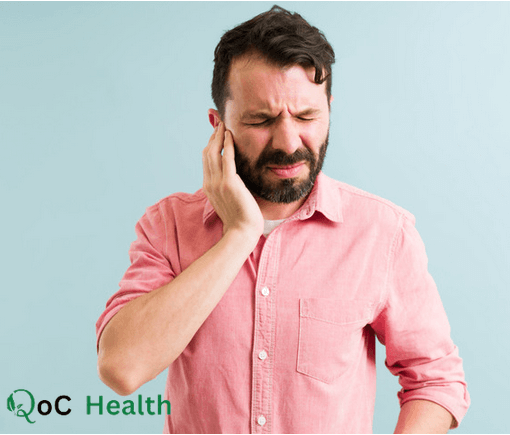While there is currently no cure for tinnitus, various natural remedies are available to alleviate symptoms and manage the associated mental health impacts. Noises in the ears that ring, click, buzz, or hiss are known as tinnitus, but the condition itself is not disease-causing; rather, tinnitus is a sign of a problem with the ear or the nerves that supply it.
Even if tinnitus is temporary, over 10% of Americans suffer from it yearly. The noises can range in volume from faint to loud and occur in one or both ears.
Severe tinnitus can make working, sleeping, or hearing difficult. Tinnitus episodes lasting only a few seconds are not unusual and can be brought on by something as small as an obstruction. However, they might also be a sign of more significant medical issues.
How is Tinnitus Diagnosed?
If you’re suffering from tinnitus, see your primary care physician first. They will examine your ear canal to see whether there is any earwax buildup or fluid from an infection. Your doctor will also review your medical history to determine whether an underlying medical condition or particular drugs may be the cause of your tinnitus.
You can be referred to an ENT (ear, nose, and throat specialist) 1, also known as an otolaryngologist. You will be asked to describe the noises you are hearing and when they first started by your ENT. They’ll also examine your ears, neck, and head. It can also be suggested that you see an audiologist so they can assess your hearing and look into your tinnitus.
An ENT may recommend imaging tests, such as magnetic resonance imaging (MRI), computed tomography (CT scan), or ultrasound if your tinnitus is pulsatile, to check for any underlying disorders or structural issues that could cause your symptoms.
Major Causes of Tinnitus

There are various causes of tinnitus, such as:
- Deafness: Tiny, fragile hair cells inside your inner ear move in response to sound waves entering your ear. Your brain interprets the electrical signals created by this movement as sound traveling from your ear to your brain. Tinnitus can be brought on by damaged hair, which can occur with age or with frequent exposure to noisy environments. Damaged hairs can send erratic electrical signals to the brain.
- Injury to the head or neck: A head or neck injury may impact the inner ear, hearing-related nerves, and hearing-related brain regions. Tinnitus from these types of accidents typically affects just one ear.
- Head or neck injuries: Injuries to these areas can impact your inner ear, hearing-related nerves, or hearing-related brain regions. Tinnitus from these types of accidents typically affects just one ear.
- Medication: Certain medications can cause tinnitus or exacerbate it. Generally speaking, tinnitus gets worse with increasing dosage. Usually, when you stop using these medications, the noise goes away.
Common medications that may result in tinnitus include antidepressants, water pills (diuretics), cancer treatments, antibiotics, and painkillers like NSAIDs.
Related: A Review Of Zencortex Supplement : Does It Work For Tinnitus?
Some Additional Causes of Tinnitus
Tinnitus can also be caused by less common issues like other ear problems 2, long-term health issues, and conditions that affect the nerves in your ear or the part of your brain that deals with hearing.
- Meniere’s disease: Tinnitus might be an early sign of Meniere’s disease. This problem with the inner ear might happen because of too much fluid pressure inside it.
- Eustachian tube dysfunction: In this condition, the tube connecting the middle ear to the throat always stays open, making the ear feel blocked.
- Ear bone changes: If the bones in your middle ear get hard (a condition called otosclerosis), it can mess with your hearing and cause tinnitus. This usually happens because of abnormal bone growth and often runs in families.
- Muscle spasms in the inner ear: Sometimes, the muscles in your inner ear might suddenly tighten up, leading to tinnitus, hearing loss, and a feeling of fullness in the ear. This can happen without any clear reason but might also be linked to nerve diseases like multiple sclerosis.
- Temporomandibular joint (TMJ) disorders: If there’s a problem with the TMJ – the joint where your jawbone meets your skull, right in front of your ears – it can lead to tinnitus.
- Acoustic neuroma or other head and neck tumors: An acoustic neuroma is a noncancerous tumor that grows on the nerve that goes from your brain to your inner ear and helps control balance and hearing. Tumors in the head, neck, or brain can also cause tinnitus.
- Blood vessel disorders: Issues with your blood vessels, such as hardening of the arteries, high blood pressure, or abnormally shaped vessels, can force blood to flow forcefully. These changes in blood flow can cause tinnitus or make it more noticeable.
- Other chronic conditions: Health problems like diabetes, thyroid issues, migraines, anemia, and autoimmune diseases such as rheumatoid arthritis and lupus are also linked to tinnitus.
Related: Do Ear drop Help With Tinnitus?
What is the Fastest Way to Cure Tinnitus?
At present, there is no cure for tinnitus, but effective methods to lessen its symptoms exist. These methods typically involve sound therapy devices (such as hearing aids), behavioral therapies, and medications.
Can Ear Wax Cause Tinnitus?
Ear wax blockage may cause tinnitus, which may result from a tiny bit of wax pressing on the eardrum. However, only approximately 1 in 20 adults have excessive or impacted ear wax, and since up to 1 in 7 people have tinnitus, getting rid of the wax may not necessarily fix the problem. Therefore, it makes sense to first rule out ear wax blockage as a possible explanation.
Other typical causes of tinnitus include middle ear infections, tooth or jaw problems, some drugs, loud noise exposure, inner ear injury, hearing loss, and even stressful or emotional circumstances.
What Foods Are Good for Tinnitus?
Some fruits, especially those high in potassium, are particularly effective in alleviating tinnitus. Bananas, pears, and tropical fruits like pineapples, papayas, and mangoes are beneficial. These fruits can help reduce blood pressure and promote healthy ear blood flow.
Do Ear Drops Work for Tinnitus?
No specific ear drops are designed to treat tinnitus, which is often the ringing sound you hear in your ears. Tinnitus generally indicates other underlying conditions, such as ear infections, earwax blockages, hearing loss, or TMJ disorders. Addressing these primary issues can usually help alleviate tinnitus.
Sound-based Therapies for Tinnitus
A common way to begin sound therapy is to select a calming, neutral sound, such as raindrops, waves in the ocean, or instrumental music, and play it as background noise during the day.
Behavioral Therapies for Tinnitus
Cognitive behavioral therapy (CBT) 3, a treatment for tinnitus, aims to alter a person’s response to the condition. It tries to reduce or alter the negative reactions connected to tinnitus rather than trying to stop the perception of sound per se.
Change in Lifestyle
Maintaining a healthy lifestyle can also minimize tinnitus symptoms. Reducing or eliminating
alcohol, cutting back on caffeine, quitting smoking, getting adequate sleep, eating well, and exercising can significantly improve your overall well-being.
The Bottom Line
It might be difficult to manage tinnitus. It frequently has no apparent cause or easy remedy unless it results from a curable underlying condition.
Nonetheless, there are methods to improve your quality of life and decrease the intensity of the symptoms.
Speak with a physician to rule out any underlying medical issues that could be the source of your tinnitus and to learn about potential treatments that might lessen your symptoms.
References
- National Institute on Deafness and Other Communication Disorders (NIDCD). Available at: NIDCD
- Mayo Clinic. Tinnitus. Available at: Mayo Clinic
- National Center for Biotechnology Information (NCBI). Cognitive Behavioral Therapy (CBT) in Tinnitus. Available at: NCBI
- How To increasebrown fat: What To Take? - July 23, 2024
- Does Brown Fat Make You Lose Weight? Benefits And Impact - July 21, 2024
- Does Coffee Increase Brown Fat? - July 15, 2024
